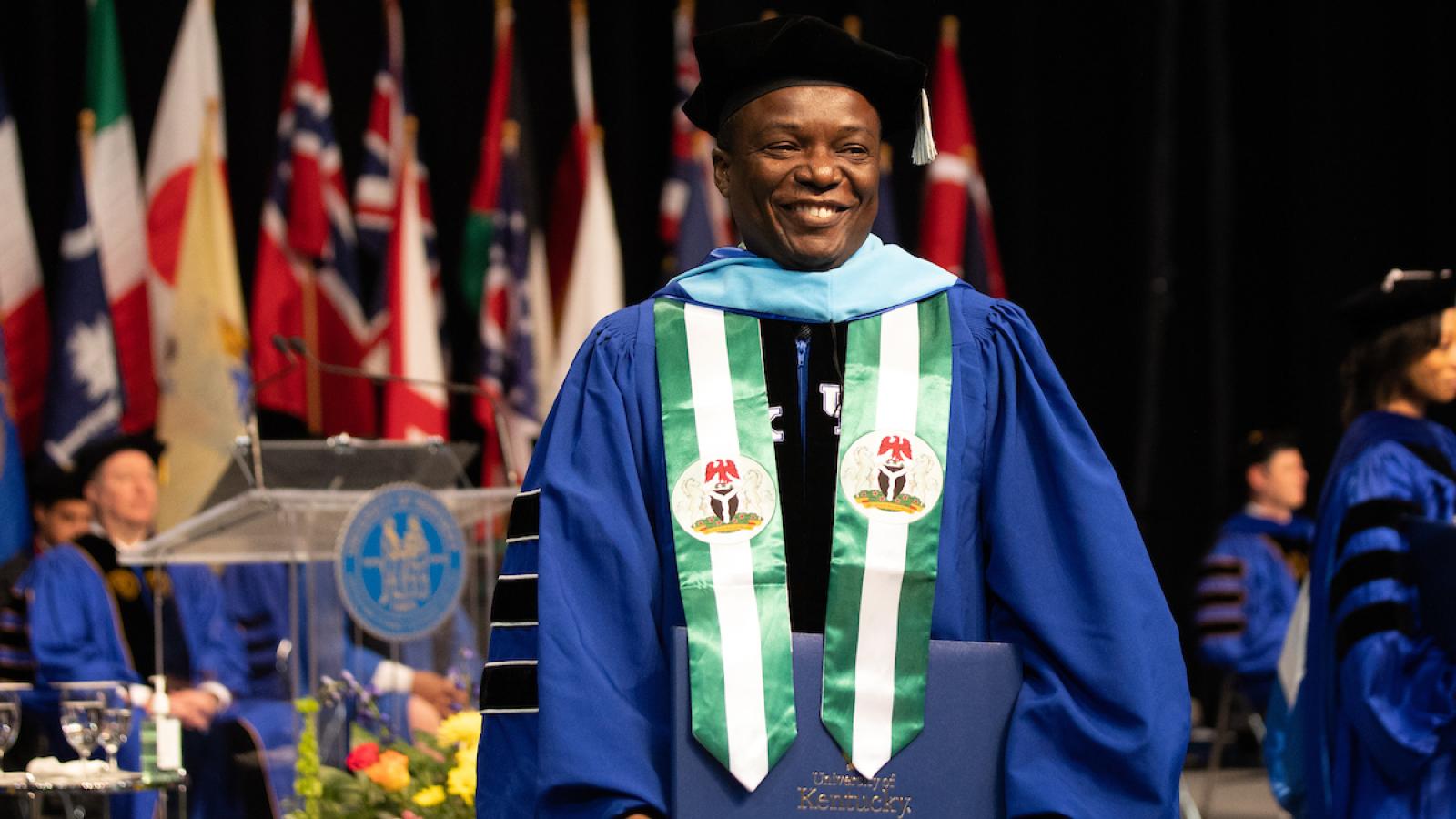
From Nigeria to Kentucky, doctoral grad pursues educational policy and evaluation career
While working in his home country of Nigeria at the University of Ibadan, it became clear to Olumuyiwa “Moses” Desmennu that pursuing a Ph.D. would be essential for his professional advancement and personal fulfillment.
Last week, he celebrated completion of that goal as he walked across the University of Kentucky commencement stage to accept his Ph.D. in Education Sciences, but his path from Nigeria to Kentucky was a much longer journey.
He initially considered pursuing a part-time doctoral program in Nigeria, but it was a difficult commitment to make, given the extended duration it would require. Life was filled with family responsibilities, adding complexity to the choice.
“Through what I consider divine providence, my status transitioned from a staff member to a university teacher, making a doctoral degree a mandatory requirement,” he said.
With an increase in urgency, Desmennu’s path to earning a Ph.D. began to solidify. The journey began when he received news that his application to the IREX University Administration Support Program was successful, granting him the opportunity to study and understand the research management infrastructure at UK.
“During this visit, the idea of pursuing doctoral study at the University of Kentucky began to take shape,” Desmennu said. “Without hesitation, I arranged a meeting with the Department of Educational Policy Studies and Evaluation. The encounter was exceptionally warm and encouraging, prompting me to immediately submit my application for a doctoral degree.”
While visiting UK, he recalls immediately feeling a sense of belonging, and excitedly called his wife to discuss returning to Kentucky. After securing funding from the Tertiary Education Trust fund (TETFund) to facilitate his participation in the doctoral program, Desmennu and his family made the move.
“The Educational Policy Studies and Evaluation program provides an environment where one can truly thrive,” he said. “My interactions with all my teachers, particularly my advisor, extend beyond the confines of the classroom. The faculty and staff are not only professional but also incredibly warm and compassionate.”
Prior to pursuing his doctorate, Desmennu’s interest in pursuing a career in educational research and policy was launched when he assumed the role of inaugural research administrator in the Research Management Office at the University of Ibadan.
“This marked the onset of a burgeoning field, presenting numerous learning opportunities. The director, fresh from studying the research management infrastructure of a U.S. university, was fervently dedicated to optimizing service delivery, creating a conducive environment for my own learning journey. A pivotal aspect was engaging in needs assessment surveys, where I gained hands-on experience in developing survey instruments, conducting surveys, analyzing data, and subsequently implementing and reporting the findings to the university administration,” he said.
In this role, he wanted to develop skills beyond his undergraduate studies in biochemistry. In 2015, he discovered that the master's program in educational evaluation at the Institute of Education, University of Ibadan, aligned perfectly with his aspirations, prompting him to apply.
“As I immersed myself in the program, my appetite for knowledge in this field continued to grow. Working within the university context, it became increasingly evident that pursuing a doctoral degree was essential,” he said.
At the same time, Desmennu was also actively pursuing training opportunities within his university and beyond. Many of the grants under his management originated from international sources, so he received invitations from various platforms to undergo training in research management best practices.
“These training sessions became pivotal moments in my professional development, sparking a growing interest in program evaluation. This newfound passion led me to seek an academic path that could equip me with the necessary skills,” he said.
This growing interest, along with a series of pivotal moments playing out in his career, culminated in his move to Kentucky.
Among his most cherished memories at UK are moments when faculty showed their support in times of uncertainty, such as in 2020 when news broke of protests against police brutality in Nigeria.
“Upon arriving in class, my teacher and colleagues expressed genuine concern, offering support outlets within the university,” he said. “They even excused me from the class to allow me to keep track of the developments back home and ensure the safety of my family members in Nigeria.”
He found support again, two years later, when one of his children faced visa challenges following high school, made more complex by a backlog created, in part, by the COVID-19 pandemic.
“My advisor stepped in, connecting me to resources within and outside the university, consistently following up on the progress. Instances like these, among many others, have truly endeared me to the department and the university,” he said.
Since enrolling at UK, Desmennu has seen a notable enhancement in his proficiency in both quantitative and qualitative analysis. He has developed adeptness in utilizing analytical software such as Winsteps, MPLUS, STATA, R, NVIVO, Qualtrics, Dedoose, as well as visualization tools like Google Charts and Tableau. Alongside this, his writing, public speaking and leadership skills have seen significant improvement, as evidenced by his roles in leading various initiatives within the Graduate Student Congress, Nigerian Graduate Student Association, Student Parent Organization, church, and the International Student Concerns Committee. Additionally, he has taken the lead in initiatives aimed at helping new students integrate into the community and has regularly served as a student facilitator during the graduate student orientation program at the University of Kentucky International Center.
With his Ph.D., Desmennu is now ready to take the next step in his career.
“The landscape of evaluation is undergoing continuous evolution, particularly in response to the dynamic and intricate challenges that education is currently encountering,” he said. “It is imperative that evaluation approaches are customized to assess the appropriateness of the solutions proposed for tackling these complexities. My objective is to engage in collaborative efforts with fellow evaluators to streamline these intricacies, aiming for a comprehensive and equitable education system that provides unrestricted access to all individuals.”
